|
|
|
Sort Order |
|
|
|
Items / Page
|
|
|
|
|
|
|
| Srl | Item |
| 1 |
ID:
086999


|
|
|
|
|
| Publication |
2009.
|
| Summary/Abstract |
In February 1998, Osama Bin Laden published a signed statement calling for a fatwa against the United States for its having 'declared war against God'. As we now know, the fatwa resulted in the unprecedented attack of 9/11. The issue of whether or not 9/11 was in any way predictable culminated in the public debate between Richard Clarke, former CIA Director George Tenet and the White House. This paper examines whether there was any evidence of a structural change in the terrorism data at or after February 1998 but prior to June 2001, controlling for the possibility of other breaks in earlier periods. In doing so, we use the standard Bai-Perron procedure and our sequential importance sampling (SIS) Markov Chain Monte Carlo (MCMC) method for identifying an unknown number of breaks at unknown dates. We conclude that sophisticated statistical time-series analysis would not have predicted 9/11.
|
|
|
|
|
|
|
|
|
|
|
|
|
|
|
|
| 2 |
ID:
106026
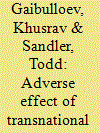

|
|
|
|
|
| Publication |
2011.
|
| Summary/Abstract |
This article investigates the adverse effects of domestic and transnational terrorism on income per capita growth for 51 African countries for 1970-2007, while accounting for cross-sectional (spatial) dependence and conflict (i.e. internal conflicts and external wars). The findings of the fixed-effects panel estimator suggest that transnational terrorism has a significant, but modest, marginal impact on income per capita growth. These results hold for two different terrorism event datasets. However, domestic terrorist events do not affect income per capita growth. Our findings differ from those in an earlier study on the impact of transnational terrorism on African growth, because we uncover a much more moderate effect. In our study, regional impacts and terrorism-conflict interactions effects are also distinguished. Moreover, our sample countries and period are more extensive. Our article contains a host of robustness checks involving macroeconomic and political variables that find virtually identical results. Alternative terrorist variables are also used, with little qualitative change in the findings. The absence of a domestic terrorism impact is surprising because there were many more domestic than transnational terrorist incidents in Africa. To promote growth, host and donor countries must direct scarce counter-terrorism resources to protect against transnational terrorism in particular. The modest impact of transnational terrorism on African growth means that developing countries' economies have been more resilient to terrorism than has been generally thought.
|
|
|
|
|
|
|
|
|
|
|
|
|
|
|
|
| 3 |
ID:
065632
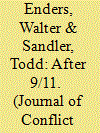

|
|
|
| 4 |
ID:
128871


|
|
|
|
|
| Publication |
2014.
|
| Summary/Abstract |
This article presents an eclectic review of the analytical study of terrorism that views all agents as rational decisionmakers. This analytical literature began in earnest with the seminal study of US skyjackings by William Landes in 1978. After 11 September 2001, the analytical literature on terrorism grew rapidly. Based on policy relevance, my survey article identifies five key areas of intense research interests. These include analyses of terrorist attack trends, the economic consequences of terrorism, the study of counterterrorism effectiveness, the causes of terrorism, and the relationship of terrorism and liberal democracies. New developments in the field focused on distinguishing key differences between domestic and transnational terrorism. Additionally, recent game-theoretic advances permitted more active agents and stages to the games. Other major developments involved the study of networked terrorists and the role of counterterrorism foreign aid. Fruitful future directions include using advanced econometric methods to discern the true impact of terrorism on growth, applying spatial econometrics to the study of terrorism, ascertaining the determinants of terrorist groups' longevity, and learning how to foster international counterterrorism cooperation.
|
|
|
|
|
|
|
|
|
|
|
|
|
|
|
|
| 5 |
ID:
078494


|
|
|
|
|
| Publication |
2007.
|
| Summary/Abstract |
This paper presents a perspective on the application of theoretical and empirical methods to the study of domestic and transnational terrorism. The use of such methods can lead to informed policy making. On the theoretical side, both choice-theoretic and game-theoretic methods are examined. For empirical applications, the paper focuses on the study of trend, cycles, and forecasting. Additionally, the use of intervention analysis in various forms is reviewed with to regards to evaluating policy effectiveness and quantifying the economic impact of terrorism. Although this paper is not intended as a literature review, some key studies are highlighted for readers to pursue in greater depth
|
|
|
|
|
|
|
|
|
|
|
|
|
|
|
|
| 6 |
ID:
080147
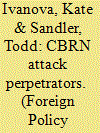

|
|
|
|
|
| Publication |
2007.
|
| Summary/Abstract |
Based on zero-inflated negative binomial regressions applied to the Monterey weapons of mass destruction data, this article assesses the future risks from chemical, biological, radiological, and nuclear (CBRN) terrorism. Once the threshold for CBRN attacks is surpassed, further attacks arise: the expected number of CBRN incidents is over one and a half times higher than past events. Religious cults and groups with a transnational orientation pose the largest CBRN threat to society. Other things constant, nationalists/separatists and religious fundamentalists are not more apt to engage in CBRN terrorism than compared to "other groups." Democratic and corrupt regimes are the likely venues for CBRN incidents. Based on past incidents, rich countries are especially vulnerable to CBRN terrorism. Thus, recent actions by the U.S. Department of Homeland Security to put more resources into guarding against CBRN attacks appear sound. This study indicates that nonfundamentalist terrorists also present CBRN risks to democracies. From a foreign policy viewpoint, CBRN terrorism is not a problem that rich democratic countries can confront alone, because the terrorists will move to where there is the least vigilance. Our study indicates the likely perpetrators and types of attacks that nations must cooperate to avoid
|
|
|
|
|
|
|
|
|
|
|
|
|
|
|
|
| 7 |
ID:
072986
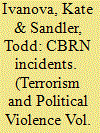

|
|
|
|
|
| Publication |
2006.
|
| Summary/Abstract |
This article investigates the relationship between regime characteristics and the likelihood of chemical, biological, radiological, and nuclear (CBRN) terrorist incidents. Odds ratios establish that democratic ideals-democratic rule, strong rule of law, and honest regimes-are associated with more CBRN incidents. Failed states may be where some terrorist groups form or take refuge, but these states have not been the venue of choice for CBRN incidents. Religious (cults and fundamentalists) and nationalist/separatist groups are not more likely than others to engage in CBRN attacks. To date, indiscriminate CBRN attacks are as likely as discriminate attacks to cause casualties. Transnational terrorist groups are less adept than others in concealing their acquisition of CBRN substances. For some regressions, democratic rule and strong rule of law are positive determinants of CBRN incidents.
|
|
|
|
|
|
|
|
|
|
|
|
|
|
|
|
| 8 |
ID:
143343


|
|
|
|
|
| Summary/Abstract |
This article reinvestigates the relationship between real per capita gross domestic product (GDP) and terrorism. We devise a terrorism Lorenz curve to show that domestic and transnational terrorist attacks are each more concentrated in middle-income countries, thereby suggesting a nonlinear income–terrorism relationship. Moreover, this point of concentration shifted to lower income countries after the rising influence of the religious fundamentalist and nationalist/separatist terrorists in the early 1990s. For transnational terrorist attacks, this shift characterized not only the attack venue but also the perpetrators’ nationality. The article then uses nonlinear smooth transition regressions to establish the relationship between real per capita GDP and terrorism for eight alternative terrorism samples, accounting for venue, perpetrators’ nationality, terrorism type, and the period. Our nonlinear estimates are shown to be favored over estimates using linear or quadratic income determinants of terrorism. These nonlinear estimates are robust to additional controls.
|
|
|
|
|
|
|
|
|
|
|
|
|
|
|
|
| 9 |
ID:
089555


|
|
|
|
|
| Publication |
2009.
|
| Summary/Abstract |
This paper applies a common-agency model to demonstrate why recent enterprise reforms that assign the State Asset Supervision and Administration Commission (SASAC) a greater role in running China's state-owned enterprises (SOEs) are apt to fail. In a theoretical framework, we show that local principals' incentive payments are likely to clash with those of SASAC as local SOE principals' promote social stability and SASAC bolsters SOE efficiency. A second-best outcome requires a social planner to restrict actions by local principals and to impose taxes/subsidies to address inter-principal externalities. In the long run, the simplest solution is to privatize SOEs and find a public-sector funding source for promoting social stability.
|
|
|
|
|
|
|
|
|
|
|
|
|
|
|
|
| 10 |
ID:
061483
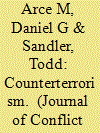

|
|
|
| 11 |
ID:
084547


|
|
|
|
|
| Publication |
2008.
|
| Summary/Abstract |
Unlike most of the literature, this paper includes domestic political considerations in which two countries must decide defensive countermeasures against a common terrorist threat. A delegation problem arises as voters strategically choose a policymaker whose preferences differ from their own. As a consequence, countries limit the presumed oversupply of defensive countermeasures. Thus, the inclusion of domestic politics gives a new perspective on counterterrorism. The timing of elections is also shown to make a difference.
|
|
|
|
|
|
|
|
|
|
|
|
|
|
|
|
| 12 |
ID:
092046
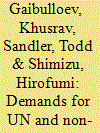

|
|
|
|
|
| Publication |
2009.
|
| Summary/Abstract |
This article presents alternative estimates for the demand for UN and non-UN peacekeeping. Generally, three-way fixed-effects models, which account for the country, year, and conflict region, provide the best estimates. The demand for UN peacekeeping is primarily influenced by the contributions of other nations (i.e., spillins), with spillin elasticity not significantly different from 1. For non-UN peacekeeping, both spillins and country-specific interests in the conflict region influence contributions. These peacekeepers' interests include trade and FDI concerns, along with proximity to the conflict. Peacekeeping missions appear partitioned: UN missions for global public benefits and non-UN missions for peacekeeper-specific benefits.
|
|
|
|
|
|
|
|
|
|
|
|
|
|
|
|
| 13 |
ID:
182537
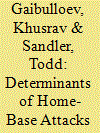

|
|
|
|
|
| Summary/Abstract |
Are terrorist groups with multiple home bases more or less predisposed to direct their violence at home or abroad? Moreover, what are the determinants of home-base terrorist attacks? We address those and related questions using the Extended Data on Terrorist Groups for 1970–2016. In so doing, we find that religious terrorist groups are less inclined than groups with other ideologies to conduct home-base attacks. In addition, multi-base terrorist groups are more apt to attack within their base country or countries after, but not before, 1990. In addition, our empirics indicate that terrorist groups with an empire goal are more inclined to attack outside their home base than groups possessing other goals (e.g., policy change or territorial ambitions). Democracy encourages home-base terrorist attacks.
|
|
|
|
|
|
|
|
|
|
|
|
|
|
|
|
| 14 |
ID:
074827
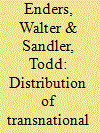

|
|
|
|
|
| Publication |
2006.
|
| Summary/Abstract |
This article applies an autoregressive intervention model for the 1968-2003 period to identify either income based or geographical transference of transnational terrorist events in reaction to the rise of fundamentalist terrorism, the end to the Cold War, and 9/11. Our time-series study investigates the changing pattern of transnational terrorism for all incidents and only those involving U.S. people and property. Contrary to expectation, there is no evidence of an income-based post-9/11 transfer of attacks to low-income countries except for attacks with U.S. casualties, but there is a significant transference to the Middle East and Asia where U.S. interests are, at times, attacked. We also find that the rise of fundamentalist terrorism has most impacted those regions-the Middle East and Asia-with the largest Islamic population. The end to the Cold War brought a "terrorism peace dividend" that varies by income and geography among countries. Based on the empirical findings, we draw policy recommendations regarding defensive counterterrorism measures.
|
|
|
|
|
|
|
|
|
|
|
|
|
|
|
|
| 15 |
ID:
106024
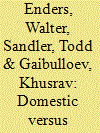

|
|
|
|
|
| Publication |
2011.
|
| Summary/Abstract |
This article devises a method to separate the Global Terrorism Database (GTD) into transnational and domestic terrorist incidents. This decomposition is essential for the understanding of some terrorism phenomena when the two types of terrorism are hypothesized to have different impacts. For example, transnational terrorism may have a greater adverse effect than domestic terrorism on economic growth. Moreover, the causes of the two types of terrorism may differ. Once the data are separated, we apply a calibration method to address some issues with GTD data - namely, the missing data for 1993 and different coding procedures used before 1998. In particular, we calibrate the GTD transnational terrorist incidents to ITERATE transnational terrorist incidents to address GTD's undercounting of incidents in much of the 1970s and its overcounting of incidents in much of the 1990s. Given our assumption that analogous errors characterize domestic terrorist events in GTD, we apply the same calibrations to adjust GTD domestic incidents. The second part of the article investigates the dynamic aspects of GTD domestic and transnational terrorist incidents, based on the calibrated data. Contemporaneous and lagged cross-correlations for the two types of terrorist incidents are computed for component time series involving casualties, deaths, assassinations, bombings, and armed attacks. We find a large cross-correlation between domestic and transnational terrorist incidents that persists over a number of periods. A key finding is that shocks to domestic terrorism result in persistent effects on transnational terrorism; however, the reverse is not true. This finding suggests that domestic terrorism can spill over to transnational terrorism, so that prime-target countries cannot ignore domestic terrorism abroad and may need to assist in curbing this homegrown terrorism.
|
|
|
|
|
|
|
|
|
|
|
|
|
|
|
|
| 16 |
ID:
006111


|
|
|
|
|
| Publication |
Cambridge, Cambridge University Press, 1995.
|
| Description |
xiii, 381p.
|
| Series |
Cambridge surveys of economic literature
|
| Standard Number |
0521442044
|
|
|
|
|
|
|
|
|
|
|
|
Copies: C:1/I:0,R:0,Q:0
Circulation
| Accession# | Call# | Current Location | Status | Policy | Location |
| 037618 | 355.6220973/SAN 037618 | Main | On Shelf | General | |
|
|
|
|
| 17 |
ID:
046775
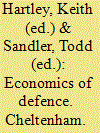

|
|
|
|
|
| Publication |
Cheltenham, Edward Elgar Publishing Limited, 2001.
|
| Description |
v.l(xxxvi, 522p.);v 2 (429p.) v.3(xi,622p.)
|
| Series |
International library of critical writings in economics
|
| Standard Number |
185278945X
|
|
|
|
|
|
|
|
|
|
|
|
Copies: C:3/I:0,R:3,Q:0
Circulation
| Accession# | Call# | Current Location | Status | Policy | Location |
| 045506 | 355.622/HAR 045506 | Main | On Shelf | Reference books | |
| 045507 | 355.622/HAR 045507 | Main | On Shelf | Reference books | |
| 045508 | 355.622/HAR 045508 | Main | On Shelf | Reference books | |
|
|
|
|
| 18 |
ID:
188824
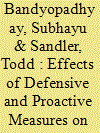

|
|
|
|
|
| Summary/Abstract |
A two-stage game investigates how counterterrorism measures affect within-country competition between two rival terrorist groups. Although such competition is commonplace (e.g., al-Nusra Front and Free Syria Army; Revolutionary Armed Forces of Colombia and the National Liberation Army; and al-Fatah and Hamas), there is no theoretical treatment of how proactive and defensive measures influence this interaction. Previous studies on rival terrorist groups are solely empirical concerning group survival, outbidding, and terrorism level, while ignoring the role that government countermeasures exert on the rival groups’ terrorism. In a theoretical framework, alternative counterterrorism actions have diverse impacts on the level of terrorism depending on relative group sizes and government-targeting decisions. In the two-stage game, optimal counterterrorism policy rules are displayed in terms of how governments target symmetric and asymmetric terrorist groups. Comparative statics show how parameter changes affect Nash or subgame perfect equilibrium outcomes.
|
|
|
|
|
|
|
|
|
|
|
|
|
|
|
|
| 19 |
ID:
054672
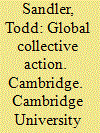

|
|
|
|
|
| Publication |
Cambridge, Cambridge University Press, 2004.
|
| Description |
xiii, 299p.
|
| Standard Number |
0521542545
|
|
|
|
|
|
|
|
|
|
|
|
Copies: C:1/I:0,R:0,Q:0
Circulation
| Accession# | Call# | Current Location | Status | Policy | Location |
| 048855 | 327.116/SAN 048855 | Main | On Shelf | General | |
|
|
|
|
| 20 |
ID:
048690
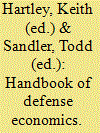

|
|
|
|
|
| Publication |
Amesterdam, Elsevier, 1995.
|
| Description |
xix, 606p
|
| Series |
Handbooks in economics, no. 12
|
| Standard Number |
0444818871
|
|
|
|
|
|
|
|
|
|
|
|
Copies: C:1/I:0,R:0,Q:0
Circulation
| Accession# | Call# | Current Location | Status | Policy | Location |
| 039114 | 338.47355/HAR 039114 | Main | On Shelf | General | |
|
|
|
|
|
|
|
|
|